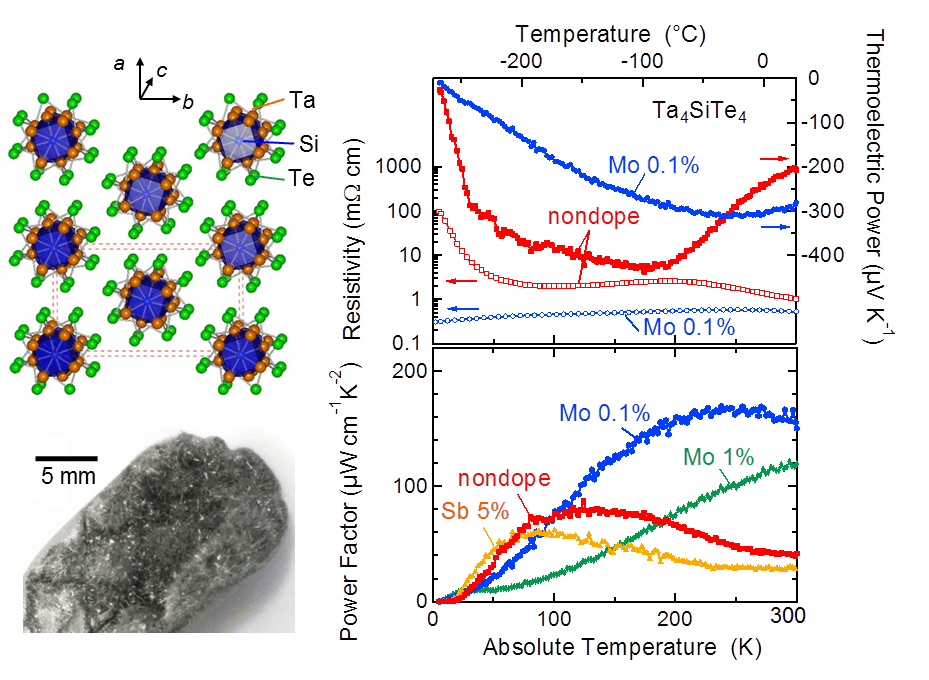May 25 2017
Thermoelectric cooling refers to a solid-state refrigeration process in which the heat present in an electrically conductive material is transferred with the help of the material's own conduction electrons and without the need for the gaseous coolants, such as chlorofluorocarbons, that are used in standard refrigeration.
 Ta4SiTe4 whisker crystals (left lower) show very large thermoelectric power exceeding -400 µV K-1 at low temperature, while maintaining low electrical resistivity (right upper). This results in that thermoelectric power factor (right lower), an indication of cooling power, becomes a very large value far exceeding those of the practical materials (typically 40 µW cm-1 K-2 for the Bi2Te3-based material). The optimum temperature of the power factor can be widely controlled by molybdenum (Mo) or antimony (Sb) doping. ©Yoshihiko Okamoto
Ta4SiTe4 whisker crystals (left lower) show very large thermoelectric power exceeding -400 µV K-1 at low temperature, while maintaining low electrical resistivity (right upper). This results in that thermoelectric power factor (right lower), an indication of cooling power, becomes a very large value far exceeding those of the practical materials (typically 40 µW cm-1 K-2 for the Bi2Te3-based material). The optimum temperature of the power factor can be widely controlled by molybdenum (Mo) or antimony (Sb) doping. ©Yoshihiko Okamoto
It is possible to scale down in size coolers based on thermoelectric technology without changing their thermal-to-electrical energy conversion efficiency and this indeed is a key benefit for localized cooling of small electronic devices. This effect is already in use for controlling temperature in devices like laser diodes and infrared sensors, and has additionally been used to provide low-temperature refrigeration for cryogenic electronic devices like superconducting sensors.
However, the lack of materials with appropriate thermoelectric efficiency ideal for practical cooling applications at temperatures less than 250 K (about −23 °C) has motivated the Researchers at Nagoya University to explore the efficiency of new compounds for accurate low-temperature applications.
We studied the thermoelectric properties of whisker-like crystals composed of a compound of tantalum, silicon and tellurium. These crystals produced very high thermoelectric powers over a wide temperature range, from the cryogenic level of 50 K (which is around −223 °C) up to room temperature, but still maintained the low electrical resistivity that is needed for practical cooling applications.
Yoshihiko Okamoto, Department of Applied Physics, Nagoya University
The samples that were grown for the experiments comprise of pure Ta4SiTe4 and various other crystals that were chemically doped with low levels of antimony and molybdenum.
For the samples, a number of material properties were measured, including thermal conductivity, electrical resistivity, and thermoelectric power, in order to compare the effects of the two dopants on their thermoelectric characteristics.
We measured a very high thermoelectric power factor at an optimum temperature of 130 K. However, this optimum temperature could be controlled over a very broad range by varying the chemical doping, and indicates that these crystals are suitable for practical low-temperature use.
Yoshihiko Okamoto, Department of Applied Physics, Nagoya University
The resistivity of the telluride-type crystals dramatically decreased at low temperatures by the addition of just 0.1% molybdenum doping. The crystals also demonstrated high thermoelectric powers that were very much related to the strongly one-dimensional electronic structures of the materials. The power factors of the crystals at room temperature majorly exceeded the equivalent values of the standard Bi2Te3-based alloys that are generally used in thermoelectric applications. Thus, these crystals represent a greatly promising route towards the creation of high-performance thermoelectric cooling solutions at extremely low temperatures.